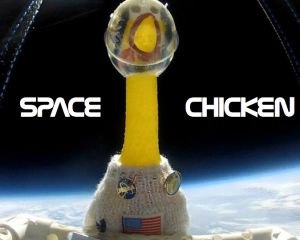Image from Jalopnik.com, “Meet Camilla”
“Einstein and an Alien: Faulkner’s Tools for Building a Better Chicken House”
Abstract for workshop/paper I will give at the 2015 Faulkner and Yoknapatawpha Conference, in Oxford, MS.
Einstein and aliens: In the early 1920s, these subjects had no place in a southern literary landscape usually populated by plantations and antebellum nostalgia. That’s probably why a couple of William Faulkner’s friends, Julius Weis Friend and Albert Goldstein, editors of the New Orleans-based little magazine, the Double Dealer, published a short story entitled “The Rider through Relativity.” Written by Herman George Scheffauer, it appeared in that magazine’s March 1921, issue. With an alien as one of the protagonists and clear references to Einstein’s relativity theory, this story suited the editors’ aims for their publication, which in the influential cultural critic H. L. Mencken’s words, “doesn’t give a damn for the old gods.” And as U.S. newspaper and magazine editors often reminded their readers at the time, Albert Einstein’s theory of relativity challenged the old god Newton, his laws of motion, and claims about the nature of gravity, time and space.
“The Rider through Relativity” is a part of the lively and imaginative discourse about Einstein and relativity theory that appeared in the mainstream and avant-garde press beginning in late 1919, following confirmation of the theory by British astronomers. Scheffauer’s short story uses the alien and literature’s more traditional activity of suicide to demonstrate relativity theory’s claim that linear time is a powerful illusion by imagining a reality where that illusion has been dispelled and, therefore, nothing can ever be lost to the past.
This paper argues that Scheffauer’s story, the national conversation about Einstein, the theory’s notions about time that appeared in the American press, and the theory’s basic concept about the nature of time, all play an important, if subtle, role in Faulkner’s faceted approach to time in The Sound and the Fury. This paper focuses on Quentin’s section (the second section of the novel) to explore Faulkner’s consideration of how the experience of linear time may be especially oppressive during periods of loss. In doing so, he implicitly considers the challenges and possibilities relativity theory posed to the human perception of time and the meaning of personal loss.

